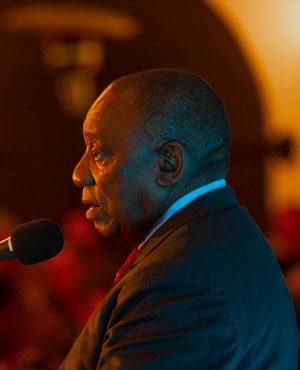The Constitutional Court on Monday gave President Cyril Ramaphosa a fighting chance to immediately start urgent repairs to the National Prosecuting Authority (NPA) - one of the most damaged and debased institutions in our democratic architecture.
Not only is he free to appoint a new national director of public prosecutions (NDPP), but the court’s judgment has also given him cover to launch a clean-up operation of the NPA, which the North Gauteng High Court in Pretoria found has been suffering from instability since 2007.
Mxolisi Nxasana, the ex-NDPP who former president Jacob Zuma forced from office in 2015, was allegedly undermined by his deputy (and known Zumaïte) Nomgcobo Jiba, who herself was recently restored to the NPA. And her ally Lawrence Mrwebi, also a deputy NDPP, has been a central figure in the internal politicking that has severely damaged the reputation of the institution. (Both had to provide reasons to Ramaphosa why he should not suspend them pending an investigation last Friday.)
Judge Mbuyiseli Madlanga went out of his way to emphasise the import of a stable and independent NPA and was scathing about Zuma’s attempts to intimidate and manipulate Nxasana, and by extension, the NPA.
"The NPA plays a pivotal role in the administration of criminal justice. With a malleable, corrupt or dysfunctional prosecuting authority, many criminals – especially those holding positions of influence – will rarely, if ever, answer for their criminal deeds," Madlanga said.
The stability and independence of the NPA was a recurring theme in Madlanga’s delivery and he repeatedly returned to it. He lashed Zuma, and said his actions created the "inescapable inference" that the then president was effectively "buying out" Nxasana.
"In my book, conduct of that nature compromises the independence of the office of NDPP. It conduces to the removal of 'troublesome' or otherwise unwanted NDPPs through buying them out of office by offering them obscenely huge amounts of money," Madlanga said.
The NPA, as with other institutions like the South African Revenue Service, was systematically neutered under Zuma, with weaklings and impressionable cadres being preferred to independent and principled leaders. It is crucial that Ramaphosa takes this chance to repair the leadership structure and that he uses the very strong statements by the Constitutional Court about independence and stability to effect lasting change.
The first port of call will obviously be the appointment of a new NDPP to replace Abrahams, and it is common knowledge that Ramaphosa has been pining for a number of candidates ever since he replaced Zuma in February.
The integrity of such a candidate must not only be beyond reproach, but Ramaphosa will have to resist the temptation to do what Zuma did and select a person who he can influence and cajole (or, bully).
The perfect candidate will be someone committed to the independence of the NPA as prescribed for in the Constitution and the NPA Act; and Ramaphosa, despite the established ANC doctrine of deployment, will have to reconcile him to the fact that an independent and strong NDPP is good for him and government.
'The most poisonous of poisoned chalices'
But the ideal candidate will also have to be politically astute. The job has proven to be one of the most poisonous of poisoned chalices and he will undoubtedly be called upon to make decisions, which will have serious political repercussions. Given how many in government and the ANC are compromised thanks to state capture, and taking into account the degree to which Ramaphosa remains committed to root out corruption, many of these decisions will probably be politically unpopular.
The new NDPP will therefore have to accept that undue pressure will be brought to bear. She (or he) must be able to play politics whilst shielding the institution from that which Abrahams and most of his predecessors could not.
Rampahosa has options
Three names are being bandied about, with Vusi Pikoli seemingly a Ramaphosa favourite. He refused to be cowed by then president Thabo Mbeki and was rewarded with a suspension from office by Kgalema Motlanthe in 2008 (then caretaker president) before eventually being removed from office after a parliamentary inquiry. Since his departure he has been very careful not to involve himself in politics and has largely refrained from making public comments about politics or the criminal justice system. He is also widely respected as a legal mind and if there’s anyone who understands how crucial the NPA’s independence is, its Pikoli.
The other names floating about are Willie Hofmeyr, currently serving as one of the deputy NDPPs, and Glynnis Breytenbach, the tough-as-teak former prosecutor who was hounded from the NPA by among others, Jiba. Hofmeyr has a solid track-record at the NPA and previously also served as head of the Asset Forfeiture Unit before being bedded down as deputy. Ramaphosa is said to respect Breytenbach for her years of dogged service, her knowledge of the NPA and her commitment to the rule of law, although her party political affiliation as a DA MP might be her undoing.
Rampahosa has options. And the country’s apex court has now given him a mandate from which he cannot afford to shirk: appoint someone fit and proper as NDPP and clean up the NPA. It’s what the Constitution, and all South Africans, demand.
